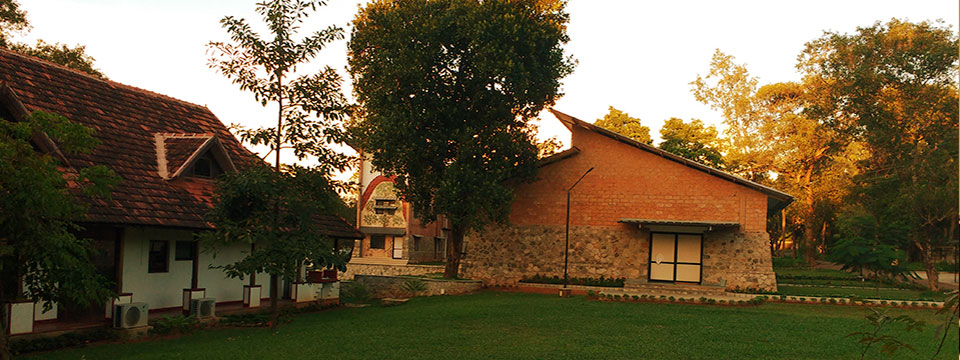Kerala State Institute of Design

The Kerala State Institute of Design (KSID) was established with the primary objective of creating a vibrant design community in Kerala through synergistic partnership between artisan community, professional designers and the general public. The Institute was merged with Kerala Academy for Skills Excellence (KASE) on 1st April 2014. One of the most important goals of KSID is to promote design education. National Institute of Design Ahmedabad (NID) supports KSID in this endeavour by offering a comprehensive roadmap to develop and strengthen the organisation, providing curriculum and courses, and supporting faculty development.
School of Product Design
School of Product Design at KSID offers design programmes which are conceived strategically, looking at the lifestyle product market and industry in Kerala, as well as in India. Designing delightful lifestyle and utility products, furniture and living spaces to enhance the living experience will be the focus of these programmes. School of Product Design offers programmes that have been tailored to fit the need of local industries as well as users, through local research and understanding the cultural social relevance in Indian context. School of Product Design has resources spread in 3 labs, namely:
Woodworking and Bamboo Workshop
Workshop with advanced machinery for prototyping various products and furniture design
Plastic and Metal Prototyping Workshop
Workshop with advanced machinery for prototyping various products and production engineering
Computer Aided Industrial Design Lab
Computer lab with high-end graphic workstations for training of advanced methods of representation techniques, virtual prototyping and product engineering
Course
Postgraduate Diploma in Integrated Lifestyle Product Design
The Integrated Lifestyle Product Design Course is a 5 semester PG Diploma Programme which involves an understanding of strong design fundamentals including Design Representation, Elements of Colour and Form, Materials and Process, Applied Ergonomics, Design Process and Thinking, Socio-cultural Influences etc. at various levels through the programme. The Main Projects will be conceived through various semesters in many levels, like Accessory Products, Utility Products, Furniture and Space where user and use of local material/elements can be an integrated part. There will be a few Mini Projects also which can look in to the needs of local craft sector, through which we can build more sensitivity towards understanding the traditional sector and local materials. Every project follows a design process and methodology essential for the student to arrive at creative and informed design decisions.
Course Highlights
The Integrated Lifestyle Product Design programme will be a balanced mix of theory and practice through lecture, research, various assignments and projects. Other areas of inputs will be Computer Aided Design for developing product, space & environment, design management, and ethnography for sustainable development etc. Field visits to diverse markets, manufacturing facilities and exposure to domain specific national events, lectures and interaction with industry domain experts would be an integral part of the curriculum.
The student concludes the programme with a 4-6 month, live industry project, guided by an in-house faculty member and assessed by a jury. Students after successful completion of this programme have the ability to conceptualise and realise design of lifestyle products in a creative, customer centric, systemic approach with local, as well as, global sensibilities and nuances.
School of Interactive Communication
Today, digital Information Technology tools are utilised for transfer, manipulation, storage, and retrieval of human symbols, cognitive products, and interactive relations. The School of Interactive Communication at KSID looks at the significance of these social and technological tools and studies how we consume these interactive tools in human communication on a daily basis. Through its academic research the School intends to generate scholarly knowledge on the phenomena of interactivity of communication so that we can overcome the challenges faced by the diverse, new and emergent users, and take advantage of the new technologies that are becoming available. The School aims to share the scholarly knowledge and professional competence developed by it with the general public, professional bodies and industry organisations through publications and consultancy services. The School also intends to train and develop a community of designers capable of designing new tools, applications and methodology to manage and improve the process of human communication.
Course
Postgraduate Diploma in IT Integrated Communication Design (IICD)
IT Integrated Communication Design is the first academic programme started by the school. This PG Programme aims at imparting knowledge and furthering research into the domain of designing interactive experiences in media, products and computer design applications. It will create graduates with good analytical abilities, skilled in specific techniques, creative in their solutions, sensitive in their approach and knowledgeable about current practices of communication and interaction design. The programme develops mature communication professionals who also have a deeper understanding of aesthetic aspects.
Course Highlights
The school has state-of-the-art infrastructure including multiple Digital Labs with high end workstations, a number of digital video cameras and still cameras, 2D Animation lab, digital editing machines, audio studios and equipment, graphic machines, and printers, apart from state-of-the-art classrooms. The campus is Wi-Fi enabled and labs are open 24X7.
School of Textile and Apparel Design
The School of Textile and Apparel Design at KSID intends to train young people as professional designers in the area of textile, apparel, coir and other natural fibres. The School also intends to train people working in the craft, handloom, MSME and cottage sectors, and impart knowledge of quality awareness, designing, dyeing and marketing through short-term training programmes and workshops.
Course
Post Graduate Diploma in Textile and Apparel Design
The two and a half year Textile and Apparel Design Programme is developed to prepare students for employment in the textile as well as apparel design/fashion industry. The course intends to train young professionals with the relevant technical and design inputs in the areas of surface ornamentations of fabric through various weaving structures and post loom processes like printing and dyeing. Emphasis is given to train them with real projects in association with the handloom, coir and garment sectors of the state. Due importance is given to the theory of fabric structures, study of looms, loom mechanism, dyeing and printing while imparting them with the practical knowledge through weaving and dyeing labs. The students will get a firm foundation in the fundamentals of design, colour, form, structure, etc.
Course Highlights
They will learn how the textiles and apparel are developed and made, through hands-on learning as well as through technical, theoretical, historical studies, field study, research and project based. The course will cover a wide range of textile techniques. The student will be exposed to designing and developing both male and female apparel. Learning to design collections for a ready to wear market, Indian as well as international, will be covered through projects.
After the first year, an industry internship of 4-6 weeks will be undertaken by the student in the textile or apparel industry to gain experience. The curriculum also incorporates training in entrepreneurship to encourage them to set up their own business.
Final Graduation/Diploma Project will be guided by KSID faculty for 4 to 6 months, during which a student will take on a challenging project - right from developing a design brief to final prototype and development. The whole experience will be systematically documented and submitted as a document for evaluation to a Jury of Faculty.
Location
KERALA STATE INSTITUTE OF DESIGN
Chandanathope, Kollam, Kerala - 691014
Contact
Phone: 0474-2710393, 0474-2719193
Email: info@ksid.ac.in
Website: www.ksid.ac.in
 India SKills Kerala 2024
India SKills Kerala 2024